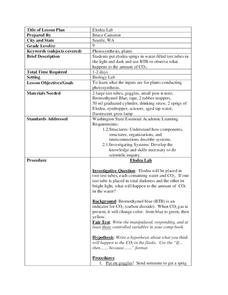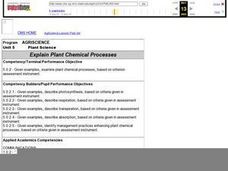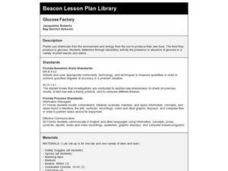Curated OER
Terrestrial Sequestration - Photosynthesis and Cellular Respiration
Students investigate how plants absorb carbon dioxide during photosynthesis. In this biology lesson, students differentiate photosynthesis and cellular respiration. They discuss the important role of plants in the environment.
Curated OER
Photosynthesis: Light-dependent and Calvin cycle
Students recognize the concepts of the light-dependent and the Calvin cycles. They draw diagrams of the light-dependent reaction and the Calvin cycle. In addition, they investigate the effects of light on carbohydrate content in leaves.
Curated OER
Elodea Lab
Young scholars observe the changes between elodea leaves placed in darkness and light. For this life science lesson, students experiment to find evidence of photosynthesis in elodea leaves. Young scholars use indicators to detect the...
Curated OER
It's Okay to Exhale: Photosynthesis and Cellular Respiration
Pupils will observe the differences between photosynthesis and cellular respiration. Then they observe the links due to climate changes and relate how climate change affects their lives.
Curated OER
Mussel Your Way Through Photosynthesis
Students, using zebra mussels (Dreissena polymorpha), elodea and an indicator dye, observe and record the role of light in photosynthesis. They consider plant production of carbon dioxide and the use of live materials in biological...
Curated OER
Chloroplasts
Students study chloroplasts, their structure and evolution. In this photosynthesis lesson students experiment with polarized light and the production of chlorophyll.
Curated OER
Explain Plant Chemical Processes
Students discover plant chemical processes through three lab activities. Overheads, data sheets, and teaching procedures provided for the unit covering photosynthesis, respiration, and transpiration.
Curated OER
Parts of the Plants that we Eat
First graders study plants and their parts to see what parts are edible. In this plant lesson students are assigned plant parts and they are to put them in the right category.
Curated OER
Soil Nutrients - Phosphorus Lab Lesson Plan
Students list sources of phosphorus in soil. They explain how phosphorus is removed from the soil and used by plants. Students list the symptoms of insufficient or excess phosphorus. Students perform experiments to examine the effect of...
Nuffield Foundation
Measuring the Rate of Metabolism
Plant respiration can be a difficult concept for young biologists to grasp; with a hands-on lab, learners can collect and graph data, then calculate the metabolism rate for the plants they studied. If you do not have a respirometer,...
Curated OER
How Does a Green Plant Grow?
Young scholars of all ages can explore the question "how do seeds grow?", design an experiment to answer the question, predict the outcome of the experiment then conduct the experiment.
Curated OER
The Mighty Hudson Stretches its Mussels
Students brainstorm possible causes of zebra mussel migration and population expansion. They identify the key causes and effects of the disturbance of the Hudson River ecosystem and research causes and effects in the disturbances of...
Curated OER
Starch
Learners examine the basics of starch and how it is used in food. In this photosynthesis lesson students experiment with variables that affect starch production in photosynthesis.
Massachusetts Institute of Technology
Lego Atoms and Molecules: Chemical Reactions
Show young chemists what a chemical reaction looks like with two parts of a hands-on experiment. First, learners conduct a wet lab where they observe the reactants (baking soda and calcium chloride, with phenolsulfonphthalein) before,...
Curated OER
Carbon Dioxide - Sources and Sinks
Where does all of the carbon dioxide come from that is supposedly leading to climate change? Earth science pupils test animal, plant, and fossil fuels as sources in this investigation. Using an indicator, BTB, they are able to detect the...
Maryland Department of Natural Resources
Eyes on Dissolved Oxygen
Learn about the factors that affect the way oxygen dissolves in salt water with a chemistry lab. After studying the molecular structure of water, young scientists figure out how aeration, temperature, and organic waste affect dissolved...
Curated OER
Using Spectrophotometers to Examine Photosynthetic Rates
Students examine how photosynthetic rates can change by using different qualities of light. They practice using spectrophotometer and the scientific method to detect the absorbance values in light treatments.
Curated OER
Owls: Top of a Food Chain
Although written for middle schoolers, there is no reason that a 3rd, 4th, or 5th grader could not also learn about food chains through the dissection of owl pellets. After you introduce the topic, learners complete an owl research...
Curated OER
Glucose Factory
Fourth graders determine, through laboratory activity, the presence or absence of glucose in a variety of plant leaves and stems. They work in groups and perform a three part laboratory which shows them how plants convert sunlighht to food.
Curated OER
Stomata
Students explore what the stoma does for a plant. In this botany lesson students complete a stomatal peel experiment and measure its densities.
Curated OER
Where do Plants Get their Food?
In this where do plants get their food worksheet, students design an experiment that will disprove the idea that plants obtain their food from soil. Students will set up their experiment and design a data table that will record data over...
Chicago Botanic Garden
The Carbon Cycle
There is 30 percent more carbon in the atmosphere today than there was 150 years ago. The first lesson in the four-part series teaches classes about the carbon cycle. Over two to three days, classes make a model of the cycle, add missing...
Curated OER
Testing Leaves for Starch: the Technique
Like good scientists, kids often want to see first-hand why things are as they are; they can do just that in the starch-testing photosynthesis activity found here. Depending on the age of your pupils, you may wish to do the investigation...
Curated OER
Alcoholic Fermentation in Yeast
Biology learners investigate the effect of sucrose concentration on yeast alcoholic fermentation. During the lesson,they compare and contrast the processes of cellular respiration and alcoholic fermentation. They design an experiment to...
Other popular searches
- Biology Lab Photosynthesis
- Photosynthesis Lab Elodea
- Rate of Photosynthesis Lab
- Photosynthesis Lab Activities
- Photosynthesis Diagram Label
- Photosynthesis Lab Activites
- Skittles Photosynthesis Lab
- Photosynthesis Lab Indicator
- Photosynthesis Label

























